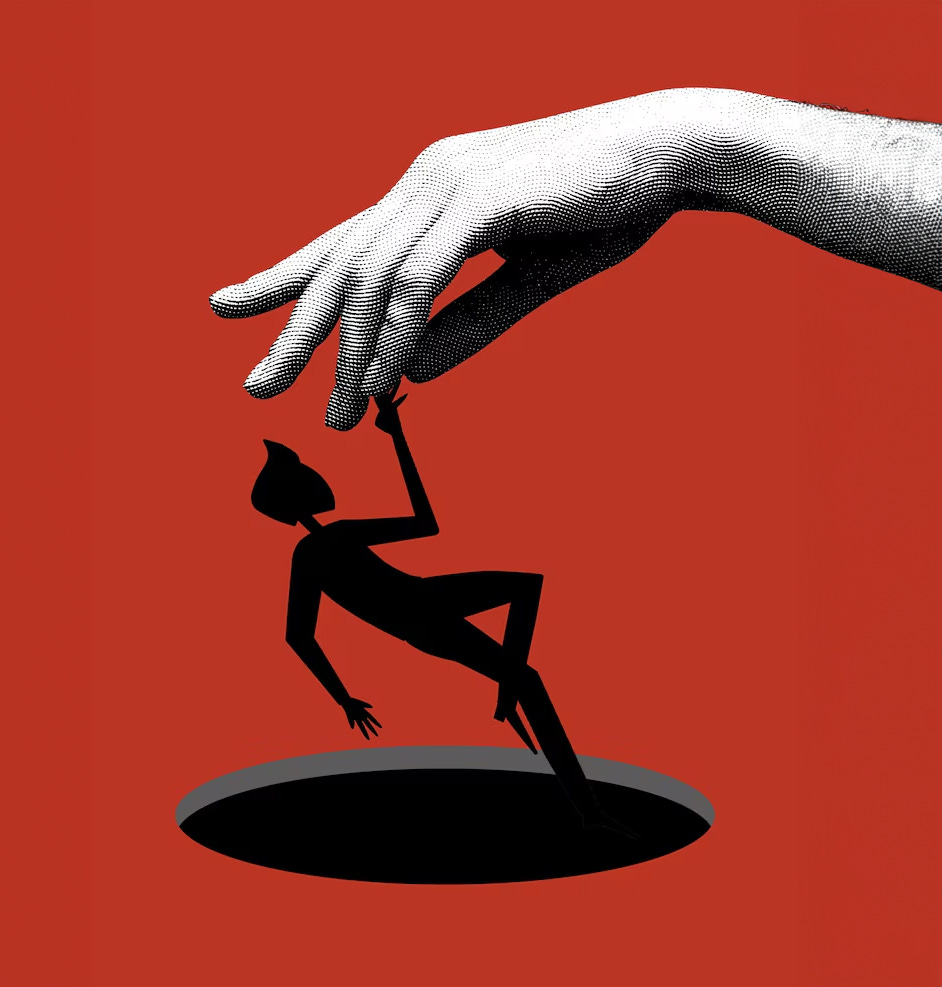The Narcissist You Don't Know
How to Spot Red Flags, Preserve Your Energy, and Protect Your Sanity
Hi, I'm Manuel Saez, 2x Founder, Award-Winning Designer, and Emotional Intelligence Coach 🌻 Here I Share the advice I wish I had while building my businesses ➜ I love fixing old motorcycles 🛵🏍️
Reading time: 4 min.
Contents:
- How to Spot a Narcissist
- Strategies for Self-Preservation
- A Path to Clarity
Having a narcissist in your life and not knowing it can be one of the most stressful experiences.
I’ve been there, and it’s emotionally exhausting.
If you don’t realize what you’re dealing with, you might start thinking you’re the one at fault. But once you learn to spot and manage a narcissist, things get a lot clearer.
Have you ever worked with someone who seemed brilliant and supportive one minute, only to belittle you in private the next?
Perhaps they gave you glowing praise in a team meeting, then complained behind your back to the boss.
Or maybe they volunteered to “save” a project, only to take all the credit while subtly implying you would have messed it up otherwise.
Then, once they’ve milked all the benefits, they move on or discard the person or project that’s no longer useful to them.
I’m not a psychologist, but I’ve encountered enough of these personalities in my professional life to recognize the warning signs.
As a founder and team leader, I’ve also spent time studying—and teaching myself—how to handle them in a way that protects my well-being and fosters a healthier team dynamic.
Here’s a simple roadmap that sums up what I’ve learned. Take whatever resonates with you, and feel free to leave behind what doesn’t.
How to Spot a Narcissist
Awareness comes first.
The only reliable way to know if a narcissist is in your life is to watch people’s behavior closely and see whether multiple red flags stack up.
One slip-up or self-centered moment doesn’t mean much on its own—everyone can be a bit narcissistic now and then. What you’re looking for are consistent patterns of problematic behavior.
Below are three common signs I’ve observed. If you see these traits surfacing again and again, you might be dealing with a true narcissist.
The Magnetic Glow
They often enter the scene glowing with charm.
Their wit and eagerness to help can feel like a beam of light.
I loved hanging out with this person, I would say to myself…
They remember your small wins and highlight them in front of others, making you feel appreciated.
They ask about your goals, nod supportively, and even volunteer help when it seems no one else cares.
If you’ve been underappreciated at work, this can feel like the validation you’ve always wanted.
You think you’ve found a real ally.
Then everything changes.
I’ve known people who, once they felt you were “hooked,” started using that initial kindness as leverage.
Suddenly, that brainstorming help or project support they offered gets mentioned in meetings: “Remember when I saved your bacon on that deadline?”
Over time, the glow of their charm morphs into a method of control.
Key Takeaway
Early-stage charm can be genuine in ordinary relationships, but pay attention if it’s used repeatedly as currency. Narcissists often weaponize their good deeds to keep you tied to them.
The Bottomless Well of Attention
Narcissists feed on attention.
It’s like a never-ending hunger that must be constantly satisfied.
They might expect you to listen to a barrage of stories about their own triumphs, personal dramas, or gripes about coworkers.
When they need praise, they show up at your desk, talk a mile a minute, and then vanish once they feel validated.
When you’re busy or have your own issues to handle, they can get angry—fury might be a better word.
That’s when the mask falls off.
If you don’t give them the praise and emotional energy they crave, they see it as a betrayal.
Suddenly, you become the enemy. They might undermine your work or speak badly about you behind your back.
We’ll dive deeper into ways to manage and protect your energy from this dynamic in the next section.
Key Takeaway
Recognize the pattern of constant attention-seeking followed by anger when you can’t provide it. Genuine coworkers respect each other’s time and emotional bandwidth. Narcissists treat attention like a resource they have an absolute right to.
The Use-and-Discard Habit
True narcissists can’t maintain stable relationships for long.
Colleagues, clients, even bosses—all end up as pawns. Once a narcissist feels someone is no longer useful or fully admiring, they move on.
Some leave jobs every year, citing vague issues with “team dynamics” or blaming leadership for “not recognizing their brilliance.”
Others stay only if they have enough power in the organization to avoid consequences—think family-run companies or situations where they’re entrenched in upper management.
I once watched someone jump from job to job, each time blaming a “toxic environment.”
Yet in every instance, the same complaints from coworkers followed: exploitative behavior, charming in the interview yet dismissive once hired, and a refusal to collaborate unless they were guaranteed the spotlight.
Beyond switching workplaces, these patterns can also play out inside one company:
A narcissist might rotate through teams, “using” teammates who can elevate their status, then quietly discarding those they no longer find beneficial.
Along the way, they often rewrite the narrative to paint themselves as the victim—or the misunderstood genius.
Key Takeaway
Frequent job changes aren’t always a sign of narcissism, but a string of relationships left in tatters is a red flag.
Patterns of burning bridges and blaming others point to a deeper issue that won’t be resolved until they acknowledge it.
Strategies for Self-Preservation
Spotting a narcissist is only half the battle.
Once you’ve identified those red-flag behaviors—charm as currency, a craving for endless attention, and a trail of broken relationships—it’s time to protect yourself.
The aim isn’t to change the narcissist (that rarely goes well) but to preserve your own sanity and maintain a healthier work environment.
Below are three key strategies to help you navigate these tricky dynamics.
Stay Respectful, Avoid Direct Combat
Narcissists can get nasty if they sense confrontation.
They might twist your words, sabotage projects, or rally others against you.
Whenever I realized I was in the crosshairs, I chose to disengage respectfully.
It’s not about letting them “win,” but about protecting your emotional bandwidth.
Arguing with them in an open forum often sets off a chain reaction of drama—narcissists excel at spinning narratives that paint you as the aggressor.
By stepping back and keeping your composure, you starve them of the conflict they thrive on.
Practical Tip
Keep communication concise and written where possible—emails, project platforms, or messaging apps.
If they try to drag you into personal topics, steer the discussion back to professional subjects or politely exit the conversation.
Setting clear guidelines (like “Let’s put this in writing to keep track of action items”) not only reduces misunderstandings but also prevents any personal jabs from escalating.
Be Wary of Their “Charm Offensive”
If a blowout happens—maybe you caught them stealing credit, or they realized you see through them—they might try to reel you back in.
Suddenly, they will bring you flowers or gifts or offer to help with tasks they’d usually ignore or shower you with praise.
From my experience, this is rarely a genuine change of heart.
It’s more a tactic to restore the old dynamic where they remain in control.
They sense your guard is up, so they switch gears, hoping a sudden wave of kindness or “team spirit” will erase your doubts.
You might find them volunteering for projects that benefit you—or even praising your skills in front of higher-ups. This can feel flattering if you’ve been craving positive recognition.
But remember: they often do it to soften you up, so you’ll let them slip back into a position of influence.
Practical Tip
If you decide to re-engage, set strict boundaries.
Make it clear you appreciate the effort but won’t tolerate a return to old patterns.
Stay polite yet firm: “Thanks for the help, but let’s keep the conversation focused on the project timeline.”
Document any changes in behavior or commitments so it’s clear if they revert to manipulation. This reminds them—and yourself—that your trust needs to be earned, not forced through a temporary charm offensive.
Establish Your Boundaries and Stick to Them
Narcissists thrive on pushing limits.
They want your time, emotional support, and professional resources without reciprocation.
If you let them cross one boundary, they sense weakness and test the next.
I’ve made the mistake of letting things slide, hoping “it’s just a one-time favor.”
But these requests multiply.
They might guilt-trip you by saying, “I really need your help—no one else can do this,” or shift blame if you protest: “Oh, so you don’t care about team success anymore?”
It’s a slippery slope—the more you give in, the more they’ll keep asking.
Practical Tip
Decide on your limits in advance.
Is it about how much off-hours communication you’ll tolerate or how many tasks you can realistically take on for them?
Communicate these limits clearly—and be prepared to enforce them, even if it feels uncomfortable at first.
A consistent “no” or “not now” can be your best ally. It shows the narcissist (and yourself) that your boundaries aren’t negotiable.
A Path to Clarity
Encountering a narcissist in the workplace can rattle your confidence. The abrupt shift from their initial charm to a draining routine of demands and manipulation can leave you doubting your instincts.
Trust your gut. If you see these patterns repeated—intense charm, relentless need for attention, and a trail of broken relationships—consider taking steps to protect your time and well-being.
You don’t need a diagnosis to know something is off.
You don’t need to endure cycles of mind games until you’re at your wit’s end.
What you do need is awareness, a plan, and the determination to maintain boundaries.
Life at work is challenging enough without an energy vampire hovering over your shoulder. Learning to spot these signs, taking respectful but firm action, and preserving your mental space can save you from endless headaches.
Your Turn
Have you ever worked with someone who drained your energy in a similar way? I’m curious to hear how you navigated it and what advice you’d give others who find themselves in a tough spot.
Share your thoughts—I’d love to learn from your experiences.
Sending you good vibes 🌻
Manuel
👉 manuelsaez.com







Thanks for this post, Manuel. I've been working with a narcissist for many years. The person had even been my boss for a big portion of the time. It took me years to realize what was going on. Actually, I only recently realized that I was dealing with a narcissist. Even today, when I'm thinking of this person, I'm getting a higher heart rate, I feel rage and some other not so nice feelings. Unfortunately, I still have to work with this person from time to time. It's still not easy, but now that I know what the issue is (i.e. I'm not the issue) I can cope better with it. And luckily I have a great boss who is very understanding and knows the problem. I can always count on them to back me up (constantly and not just when it suits them).
I hope that should I encounter another narcissist in the future, that I won't take me decades to realize this. And I hope that you were also able to clear the situation with 'your' narcissist.
I dated a woman who was a narcissist. At first, I didn't know what I was dealing with. She was extremely physically attractive and had a big sexual appetite. She also regarded herself as a genius, an authority on everything. She frequently bragged about herself and put down others.
Despite her self-proclaimed superiority, her life was a shambles. She was technically homeless, living with a friend in exchange for pet-sitting and housekeeping. She was almost broke, with a little coming in from a trust fund. She had lost her children to social services and her husband had left her. She was often deceptive and lied all the time. That's why it took me so long to figure out the facts about her life.
In her attitude towards me, she would alternate between praise and put-down. It was totally confusing and I began to wonder whether I was the one who was nuts. I was seeing a therapist at the time, and when I lay the thing out before him, he said, "Sounds like a narcissist." "Uh?" I said, "What's that?" He read me the DSM definition and it just clicked. I did some research and, sure enough, she fit the bill. And, in a collateral realization, so did my own father.
When I "amicably" ended our relationship, she became enraged. She started harassing me by text and email. We're talking between thirty and forty texts and emails a day. Some of them totally deranged, threatening and vicious. It took a lot of restraint to not respond. But after a few weeks, they finally tapered off.
What I can say is that the moment you sense that someone is a narcissist, keep your distance. The only way to deal with them is to cut off them off completely, if you can. If it's in the workplace, you want to engage as little as possible, and keep it professional. Otherwise, they will feed on you. Don't think you can fix them. They are broken inside and use others to mirror their insecurities. Observe the projections and reversals of the most popular narcissist in town right now. That should give you some idea of what you're dealing with.